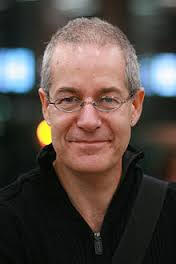I am a practicing Stoic. Which sounds weird, when you think that I'm referring to an ancient Greco-Roman philosophy popularly and incorrectly associated with suppressing emotions and going through life with a stiff upper lip. In fact, Stoicism is about empowering oneself to endure what the universe throws at us while enjoying life to the best of our abilities. Even if one is severely physically disabled.
The best way I know to make that last point is to share the story of my friend Larry Becker. Larry is a retired professor of philosophy and a Stoic. He has been suffering for decades from the aftermath of polio, and yet he is known for heroic feats performed to overcome the effects of his disability and flourish in his teaching and scholarly career like learning to grade his students' papers with a foot .
Larry had polio in his teenage years, prior to the vaccine. Initially he was quadriplegic and confined to an iron lung. After two and a half years of rehabilitation, he had regained the use of his legs, but not of his arms. Larry's breathing was compromised by polio, a condition that has gotten worse with age. Because he cannot use his diaphragm, he breathes with his neck muscles; when he goes to sleep, he stops breathing entirely until his blood CO2 climbs enough to wake him up. As he wryly puts it, "That's inconvenient." So he uses a small portable ventilator for sleeping and for resting during the day.
Larry explains that early on he was able to leave his wheelchair and walk up and down stairs to get to and from his teaching classroom. But things began to get worse in the early 1980s, and he started dreading the idea of going to class or attending faculty meetings well, all right, everybody dreads faculty meetings . His initial reaction was to say nothing to others and to avoid having to climb stairs as much as possible. But he quickly got to the point where he had a hard time dealing with just the four steps he had to negotiate between his office and the open campus. He was spending idle time at his desk, worrying about getting outside, and then about going home in the evening.
His initial analysis was that he was suffering from a phobia, so he went to see a psychiatrist who specialized in rehabilitation. The psychiatrist himself was totally blind, which must have made it no cakewalk for him to get through medical school. The psychiatrist's office was in a nice old house, with five uneven steps from the parking lot, four more to the front porch, and no handrails. Not good.
The psychiatrist asked Larry what was bothering him right at that moment, to which he replied, somewhat testily, "I'm bothered by how I'm going to get out of your building." The psychiatrist calmly picked up his phone, called his secretary, and asked her whether they had a ramp running around the back of the building, down to the parking lot. She confirmed that they did. "How do you feel now?" inquired the psychiatrist.
"I feel fine about that," Larry said.
The doctor then went through a series of potential practical solutions to the problem: Can you change office? No. Can the university build you a ramp? Possibly. The doctor told Larry that he had taken subways to get to medical school, and that as a blind man he was terrified of subway platforms. "It's a reasonable fear," he added, "and you'll notice that I chose to practice in a city without subways." At that point Larry began to feel a bit foolish. The university did build a ramp for him, and he got a wheelchair with foot controls. That was a good lesson in practical Stoicism, without the theory.
Larry reflected that these sorts of things had happened to him throughout his life and that they happen to everyone, disabled or not. He found that Stoicism was particularly useful to deal with his predicament. For instance, one of the fundamental ideas of this philosophy is the dichotomy of control, which the slave-turned-teacher Epictetus summarized in this way: "Some things are within our power, while others are not. Within our power are opinion, motivation, desire, aversion, and, in a word, whatever is of our own doing; not within our power are our body, our property, reputation, office, and, in a word, whatever is not of our own doing." If you internalize this dichotomy the same, by the way, encapsulated in the Serenity Prayer used by 12-step organizations you will focus your energy on what you can control and develop an attitude of equanimity toward the rest. Can I walk from my office to my classroom? No. Okay, then, can the University build me a ramp for a wheelchair? Yes. Fine, I will go for the chair and the ramp.
Stoicism is also about prioritizing things in life. The most important thing is to work to become a better person, which for the Stoics meant to exercise the four cardinal virtues of practical wisdom, courage, temperance, and justice. Larry found meaning in navigating difficulties to the best of his abilities practical wisdom , in accepting his condition and yet working around it courage , in measuring his responses to the circumstances temperance , and in treating other people, from his students to his wife of many decades, kindly and with fairness justice . If Larry could do it, so can you and I.



